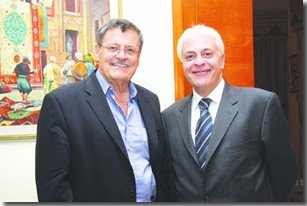The Daily Star
Beirut, Lebanon
February 20, 2012
U.S. providing secret aid to Syria opposition: diplomat
By Antoine Ghattas Saab
 The Syrian uprising will eventually succeed in ousting President Bashar Assad, a diplomat told The Daily Star, adding that United States is secretly providing aid to the Syrian opposition.
The Syrian uprising will eventually succeed in ousting President Bashar Assad, a diplomat told The Daily Star, adding that United States is secretly providing aid to the Syrian opposition.
Walid Maalouf, who served as alternate representative for the U.S. to the General Assembly of the United Nations in 2003 and maintains close ties with the U.S. administration, voiced his belief that the Syrian people's revolution against the regime would inevitably result in the people's victory. According to Maalouf, action in the diplomatic arena will gradually wear away at Assad's regime, allowing the Syrian National Council to take power.
He cited several factors that are contributing to the momentum that will lead to decisive action against Assad's rule, including the vote of the U.N. General Assembly last week, which condemned the crimes committed against the Syrian people and was passed with 137 votes, as well as the recent hints by the EU that it would recognize the SNC as the representative of the Syrian people and U.S. Senator John McCain's demand to arm the Syria opposition.
Maalouf said the doors of the White House and Congress are open to officials from the Syrian expatriate community, most of whom are supportive of the SNC, adding that the U.S. is secretly providing aid to the opposition, though he did not specify whether this support was financial or military.
Asked how the U.S. views the upheavals of the Arab world, Maalouf said the country viewed the developments with extreme optimism given the new emphasis on democracy and human rights, principles which have long been weak in the region. He added, however, that the period between uprising and democratic transition varies depending on the country, with change being more rapid and decisive in Tunisia and Libya than Egypt, where citizens are now confronting military rule.
According to Maalouf, following decades of dictatorship, the people of the Middle East were able to witness firsthand through social media the openness of Western societies, which gave momentum to the uprisings.
As for American policy toward Lebanon, Maalouf reiterated the country's unwavering support for Lebanon's sovereignty and unity, along with its support for U.N. resolutions 1559, 1680 and 1701 and the Special Tribunal for Lebanon. Resolution 1559, which was passed in September 2004 and which Maalouf supported at the United Nations, called on foreign forces to leave Lebanese territory.
Asked how Lebanon is different following 1559 and the departure of Syrian troops from Lebanese territory in 2005, he said that the current situation has improved as Syrian intervention in Lebanese affairs is now limited and the current pro-democracy protests in the region reinforce the security of Lebanon's own democracy. He added that members of the March 14 coalition can now freely express their opinion without the intimidation common under Syrian hegemony.
Separately, Maalouf highlighted the important contributions of hundreds of thousands of Lebanese-Americans in shaping U.S. foreign policy in general and toward Lebanon in particular. He also reiterated the United States' rejection of any dialogue with Hezbollah, saying that the party's arms pose a grave danger to Lebanon's national fabric and state institutions.
|

